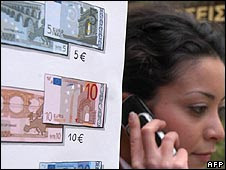
Bankers' bonuses should be deferred in order to reward long-term success rather than short-term risk-taking, G20 finance ministers have suggested.
In a draft proposal agreed in London, ministers backed the idea from the UK as an alternative to a formal cap on bonuses sought by some countries.
Ministers also said they would continue financial support for the global economy despite some signs of recovery.
And they agreed to give emerging economies more say on the world stage.
The BBC's chief economics correspondent Hugh Pym said it appeared a consensus was emerging on bank bonuses.
He said ministers had agreed in principle that bankers' pay should be long term, with no cash bonuses up front, and that there should be greater transparency about what staff are actually being paid.
But our correspondent said the details of any plans would still need to be thrashed out before the summit of G20 leaders in Pittsburgh, Pennsylvania later this month.
'Serious mistake'
Some countries, including France and Germany, had wanted the G20 to start discussing "exit strategies" - ways of scaling back their spending on fiscal stimulus.
They are already beginning to emerge from recession and had argued that such spending was leading to dangerously high levels of state debt.
| |
Opening the meeting, Prime Minister Gordon Brown warned that any such scaling back would be a "serious mistake" and could risk causing another "downward lurch" in the global economy.
The draft communiqué suggests his concerns were taken on board as ministers have agreed in principle to continue spending until a global recovery is firmly secured.
Britain had also opposed suggestions by France and Germany to place a mandatory cap on bankers' bonuses.
Instead, Mr Brown and Chancellor Alastair Darling backed a system of deferred bonuses which G20 ministers now appear to have accepted.
Their draft proposals contain plans to withhold bonuses for up to five years until the longer-term impact of bankers' actions is clear.
They also suggest including claw-back clauses in bonus agreements which would allow money to be recouped if decisions which seemed successful later go bad.
Bonuses would also be paid in stock options, not cash, so that individuals only benefit if their company does.
Mr Brown said earlier there could not be "a return to the past ways of governance" within the banking sector, which resulted in pay awards that were "offensive" to the public.
"Specifically, pay and bonuses cannot reward failure or encourage unacceptable risk taking," he told ministers.
More say
The third aspect of the draft communiqué concerns the representation and voting rights of emerging economies within the IMF and World Bank.
At present, for example, China has the same power as the Netherlands, despite the vast difference in the size of their economies.
The draft shows ministers have agreed to raise "significantly" the say of emerging nations' on the world stage.
The BBC's business correspondent Joe Lynam said the draft would now be turned into formal guidelines by the Financial Stability Board, which is made up of representatives of central banks and regulators from around the world.
Those guidelines will be discussed and voted on in Pittsburgh, but it will be up to individual state governments to decide whether or not to turn them into law.
The BBC


